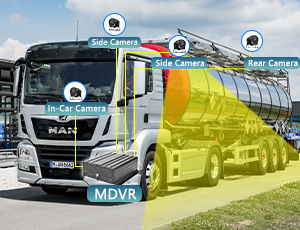Commercial Vehicle Camera Systems: An Essential Guide for Fleet Managers
If you're a fleet manager, you know the importance of safety and security on the road. One way to enhance safety and security is by installing commercial Vehicle Camera systems. In this article, we'll explore the benefits of commercial vehicle camera systems, the types of cameras available, how to choose the right system, and more. Benefits of Commercial Vehicle Camera Systems
Increased Safety The primary benefit of commercial vehicle camera systems is increased safety. With cameras installed in various locations on your fleet vehicles, you can monitor the road and surrounding areas for potential hazards. This includes monitoring blind spots, pedestrian traffic, and other vehicles on the road. With this information, you can make more informed decisions and avoid accidents. Improved Driver Behavior
Another benefit of commercial vehicle camera systems is improved driver behavior. When drivers know they're being monitored, they're more likely to follow safety protocols and drive more cautiously. This can lead to fewer accidents and improved overall safety for your fleet. Reduced Liability
Having commercial vehicle camera systems installed can also reduce liability for your company. In the event of an accident, you'll have video footage to provide evidence and support your case. This can help protect your company from false claims and expensive lawsuits. Types of Commercial Vehicle Camera Systems
Forward-Facing Cameras
Forward-facing cameras are installed on the front of your fleet vehicles and are designed to capture video footage of the road ahead. These cameras are particularly useful for monitoring traffic and road conditions and can help drivers make better decisions on the road. Rear-Facing Cameras
Rear-facing cameras are installed on the back of your fleet vehicles and are designed to capture video footage of the area behind the vehicle. This can help drivers avoid collisions while backing up or maneuvering in tight spaces. Side-View Cameras
Side-view cameras are installed on the sides of your fleet vehicles and are designed to capture video footage of blind spots. This can help drivers avoid collisions with other vehicles, particularly when changing lanes or merging.
Multi-View Cameras
Multi-view cameras are designed to provide a comprehensive view of the vehicle's surroundings. These cameras are particularly useful for larger vehicles, such as trucks and buses, and can help drivers navigate tight spaces and avoid collisions. How to Choose the Right Commercial Vehicle Camera System
Consider Your Fleet's Needs
When choosing a commercial vehicle camera system, it's important to consider your fleet's specific needs. This includes the types of vehicles in your fleet, the driving conditions your vehicles operate in, and the safety challenges your drivers face.
Evaluate Camera Quality
The quality of the cameras in your system is also an important factor to consider. Look for cameras with high resolution and a wide field of view to capture as much detail as possible.
Choose a Reputable Brand
When choosing a commercial vehicle camera system, it's important to choose a reputable brand with a proven track record. Look for brands that have been in the industry for a while and have a history of providing high-quality, reliable products. Installation and Maintenance of Commercial Vehicle Camera Systems
Installation
The installation of commercial vehicle camera systems should be done by a professional. This ensures that the cameras are properly installed and configured for optimal performance. Maintenance
Regular maintenance of your commercial vehicle camera system is also important to ensure that it continues to function properly. This includes regular cleaning of the cameras, checking for damage, and ensuring that all components are working as they should. Conclusion
Commercial vehicle camera systems are an essential tool for fleet managers looking to enhance safety and security on the road. By choosing the right system and properly installing and maintaining it, you can improve driver behavior, reduce liability, and ultimately, ensure the safety of your fleet and those around it. FAQs
1.What is the cost of a commercial vehicle camera system?
The cost of a commercial vehicle camera system varies depending on the type and number of cameras needed, as well as the quality of the cameras and the brand. On average, the cost of a basic system can range from a few hundred to a few thousand dollars. However, investing in a high-quality system can ultimately save you money in the long run by reducing accidents and liability. 2.Are commercial vehicle camera systems legal?
Yes, commercial vehicle camera systems are legal and can provide valuable evidence in the event of an accident or incident. However, it's important to check with your local laws and regulations to ensure that you're in compliance with any specific requirements. 3.Can commercial vehicle camera systems be used for driver monitoring?
Yes, some commercial vehicle camera systems are equipped with features such as gps tracking and driver behavior monitoring. These features can help fleet managers monitor and improve driver behavior and reduce the risk of accidents. 4.How do I choose the right camera system for my fleet?
When choosing a camera system for your fleet, it's important to consider your specific needs and the challenges your drivers face. Evaluate the types of cameras available, the quality of the cameras, and the brand reputation. It's also a good idea to read reviews and speak with other fleet managers to gather feedback and recommendations.
5.How can I ensure my camera system is functioning properly?
Regular maintenance and testing of your camera system is important to ensure that it's functioning properly. This includes regular cleaning of the cameras, checking for damage, and testing the system's recording and playback functions. It's also important to have a plan in place for addressing any issues that may arise.





